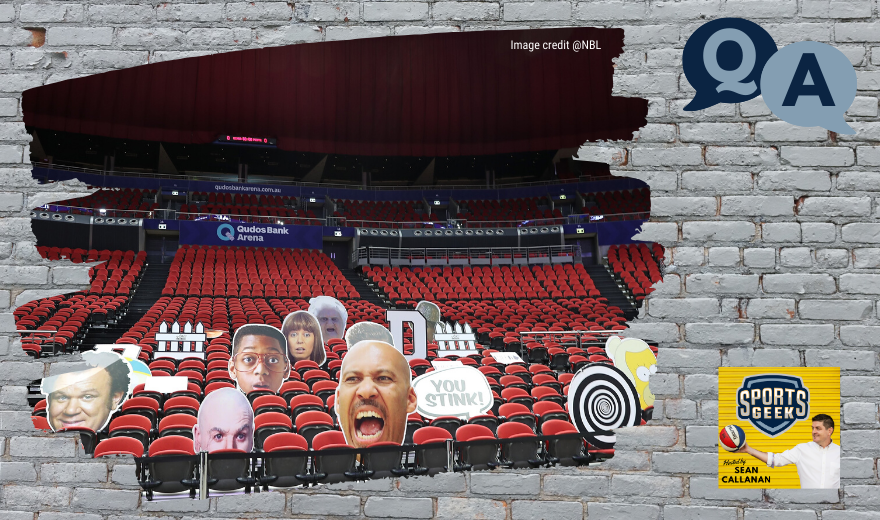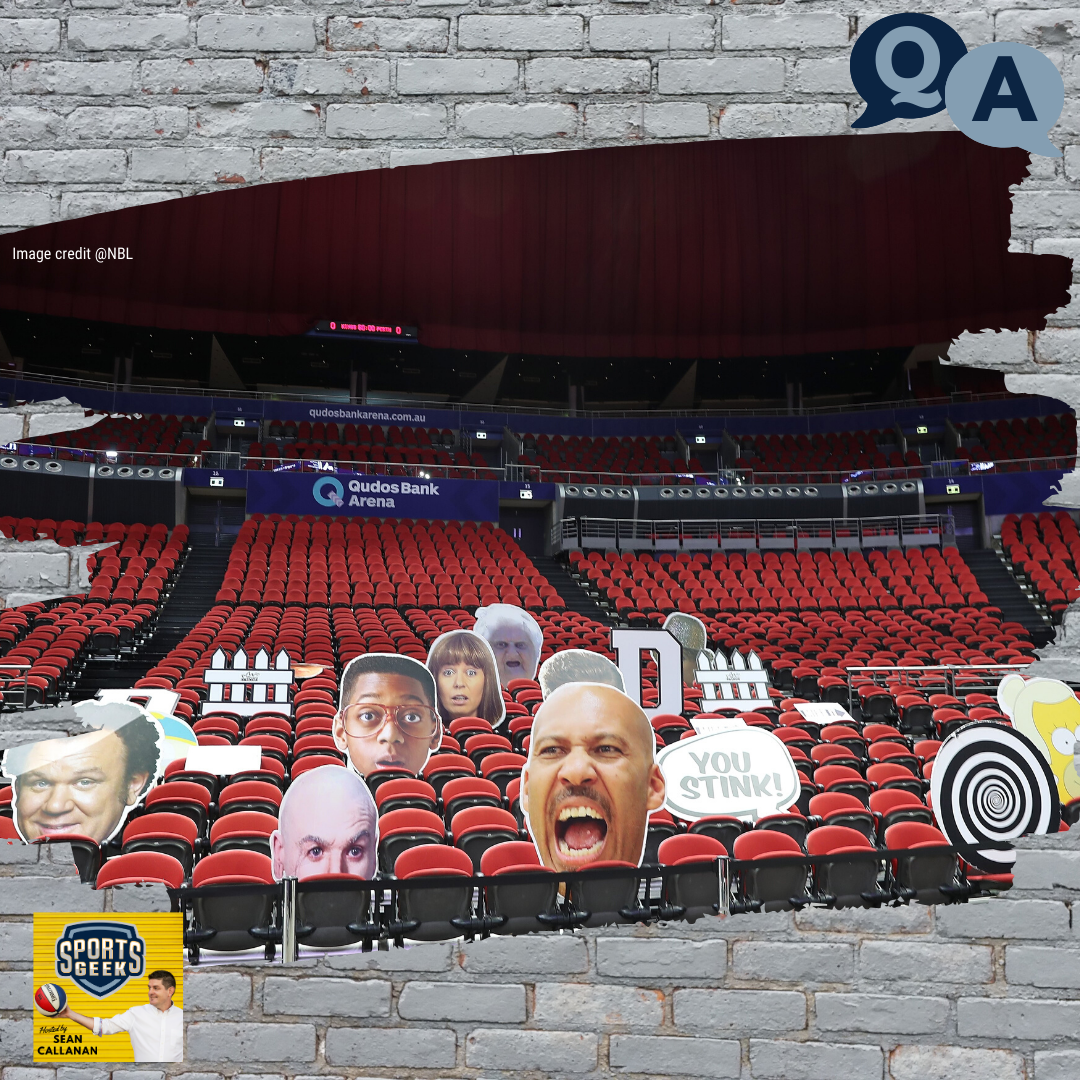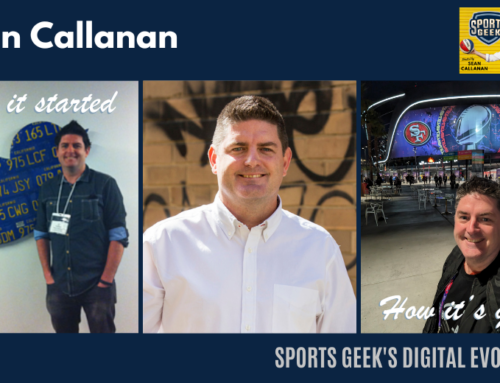On episode #15 of Sports Geek Q&A episode Sean Callanan answers the following questions:
- How should sports react to coronavirus? Big question from#SportsBizMelb
- How do you handle the balance of positive & negative feedback? Ben Scully from Sports Where I Am via website
- Will streaming get better? Glenn Mills via website
Listen to Sports Geek Q&A for the answers
Can't see podcast player? Click here to listen
Read Sports Geek Q&A answers below
Transcriptions done by robots in Descript app (they are getting better but not yet perfect)
So this question came from our Sports Biz Melb meet up because it was the biggest question in the room. so we are hosting sports sportsbiz networking events in Melbourne every single month. we've done three so far this year. it's been one of my missions to do it more often. and the question was. How should sports react to coronavirus? So before contexts and of when this discussion was happening, and when I'm recording this, because a lot will change between when I'm recording right now. And when you listen to this on potentially Friday, may 20, March 20 so this, yeah, I'm recording this. The day after the NBA suspended, the season, a lot of tournaments and, and have now suspended their seasons. And this morning the Australian Grand Prix was canceled. So the first question was to play or not play. and I think it makes perfect sense to move into the netplay space, especially for, and it's my primarily maintaining, security and health of the fans. So everything currently, the current advices when there's a large gathering of people that, helps as far as sprayed. So I think. The NBA, the NHL, NCAA, the grand Prix role, making the right decisions on these, on this case. and I think, you know, we'll probably see more by the time this gets, by the time this gets published. So I think the thing is, it should be. Care for the fans, care for the players, something that we're currently facing and challenge with, with Gravitas on, on having the, having the guys go into a studio, making sure it's safe, they're making sure it's safe for them to travel to the studio and the like. you want to make sure that the players are protected in this instance. then I think longer term, I think it will come down to how to, there's a couple of things. How does digital play a part. In informing fans about what is happening, what potentially will happen in the future. But then also, I think there's also a bigger picture play, and I do liken it to going, to the T20 world cup. so last Sunday. I was at the cricket women's cricket world cup final world cup final mcg 86,000 people there. There was talk of the coronavirus being a concern, but the, the, the event went ahead. the only, you know, and I enjoy the event. I thought it was a great event. I think the only. If I have a criticism or something that I could have done, he's done some public service announcements around what good behavior and good hygiene behavior and what good crowd behavior is. so whether that's, a simple PSA that says if you're going to cough, cough into your, into your, into your arm or, or use a hanky or, wash your hands. All of those kinds of things that, the messaging that we are currently getting out. I think sport can play a part, similar to the. To, how I as Roma reviews their social platforms to amplify the stories of missing children. I think there's potentially an opportunity for sports to help get the message out, around what he's, I guess good behavior and safe behavior and good hygiene in this, in this time. but I also think there is also, some real longterm, concerns and we need to look at, how digital can. Keep the conversation going with them. Teams and fans if there is long layoffs. So what, what do digital teams do with no content? how do you tell a story if there is restrictions around who is attending the events? those kinds of things. So there's still a lot to be played out. I, I, you know, I do feel for everyone that is affected by this, and hopefully, you know, again, fingers crossed, touch wood, all those things. In four to six weeks, things start returning to normal and we can help, you know, we can hope that that happens. but it is a little bit of wait and see. but I think erring on the side of, of caution, does make sense. They're getting back into the more normal questions because I am not a doctor.
Transcriptions done by robots in Descript app (they are getting better but not yet perfect)
This question comes from Benn Scully from Sports Where I Am. He sent in a question regarding how do you handle, you manage the positive negative feedback. And so I'll read this question first cause it was really well thought out and thank you very much for sending in Ben. Hey mate, I'm interested in how sports brands would manage the balance between focusing on too much negative feedback versus seeing as an early indication of a trend that might need to be addressed. I don't know how to word a better then, but a small example would be 99% positive and encouraging on most of the platforms and most of the ads, but occasionally we get someone that either under doesn't quite understand us. It doesn't quite understand our messaging, and then weighs in with a whole bunch of, potentially incorrect. and in the, in the situation is, and I'm now, I'm paraphrasing Ben, so I've gone, I've gone off script, and he was asking for examples of how sports teams handle a high volume of negative content. Comments and have a balance. So I didn't answer this. A couple of episodes back around there is going to be tension only be this lockdown of accounts, or lockdown of social comments because there is a little bit of trolling happening in the, in the fan piece. but there is a little bit of, you've got to be careful to listen to the small minority of those negative comments. I think if you're talking about a brand is different from a, from a team, there are opportunities there. You can literally just hide the comment, which restricts it from being seen by other people it is a little bit putting the head in the sand to a certain degree potentially. but if it's literally just a troll in hiding the comment or even deleting the comment or banning that person to me makes perfect sense. but if there is a way to turn around that person, if they are misinformed, then I think there is a good value in doing that. And I have seen cases, one example , we were working with the, with the stadium when they opened up and they had a new stadium and, and unfortunately, one of the, one of the, one of the rows in the state was mislabeled. And so there was a whole row in the stand that didn't actually exist, but there was 10 people standing there with tickets for that road that didn't exist. So they all had to be moved. And so a lot of that conversation happened on. Social media happened on Twitter. Hey stadium, we need to be moved. And so they were all moved. They were all put in different positions. That was all fine. Unfortunately, one of the noisiest ones happened to be sitting in a really poor position. I was sitting behind a camera. I had an obstructed view, which again, got them to kick off again. now. They didn't really have a large following and we could have probably ignored it, but what we did was we alerted the staff at the side of them and again, move them again, showed that, that we cared and that we responded. And by the second, third, and fourth day of the test match, it was, so it was cricket in this case, they were one of the biggest advocates for the stadium. So we were turned that negative, I guess brand ambassador around to a positive one because we took those extra steps. so it is that one is a hard one to scale, but you still want to be looking for those opportunities to turn those around. This now, you know, and then the other side of it is some people never want to be turned. So, I don't know if I've given you an exact, answer to that, Ben, but it is a bit of managing where you can, trying to identify and sort of having your own little flow chart. Is this just a troll? Yes. Lin. Then just delete or hide or ban. Is this a genuine concern? Yes. we will respond to it and try to rectify it. Is this a continuing concern? Then we need to improve our process or we need to update our FAQ and that kind of stuff. So I think that's the main, that's the main thing that you want to do. I do think, you know, monitoring feedback and comments on your ads is really important. I've seen a lot of ads that are running really. Yeah. Out there in the wild with people saying all kinds of things on the ads. I think leaving that unintended is really poor, both customer service and, and just very poor few brands. so hopefully that answers your question. Ben and I guess we'll catch up for coffee to find it if it, if it actually has.
Transcriptions done by robots in Descript app (they are getting better but not yet perfect)
The last question. is from Glen Mills. He sent in via by the website. Thank you very much. Plain. He says, hi, Sean as a sports nut. I made the decision to drop, a Foxtel and switch to Kayo as a streaming service, but he says, Oh, I'm sure you found buffering and freezing a nightmare and destroys any viewing pleasure. Is there a solution? Will we say the quality of streaming anytime soon? Keep up the good work. Well, first of all, thanks Glen. I think in this case, this is a case of Australian internet, more so than Kayo as a streaming products so I think this is more about the capacity of the Internet you have at home. Then Kayo as a product, are found to be quite a good product. And it's a bit an indictment on streaming products overall, especially in the Australian market, that these are pleasant surprise that you opened it up and it worked. When we have had some real filed and botched, streaming services. so I think the product works, I think it still has some improvements to be made. I think search can be a little bit better, but as far as freezing and buffering, I find that across multiple streaming services, particularly around peak times. So what normally happens is, seven to eight to nine o'clock is when everyone is streaming. So it's not that just the streaming service is suffering. It's actually the pipes. The Australian internet, as we know, is going to be under even more stress right now with more people working from home. but a lot of people are streaming at peak times at night. And that's when you see those, those services start to suffer. So I don't think it's a Kayo problem. I think it's an internet problem. so hopefully the advent of 5g starts, starts to open up some opportunities there. And, and, and hopefully, you know, hopefully it'd be great when, when we finally get the incident in Australia and we have, I say that as a joke often, but it's, you know, it's a poor one because if we had quality internet, I think we'd be able to do some really amazing things.
Pick my brain
Want some help on a campaign, sponsorship or content but don’t know where to start? Book a time with Sean Callanan for a Pick My Brain session.
The Pick my brain session is a two-hour video consulting session where you can get Sean’s thoughts and opinions on ticketing or sponsorship campaigns, campaign development and digital content review.










